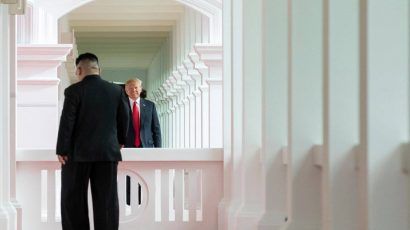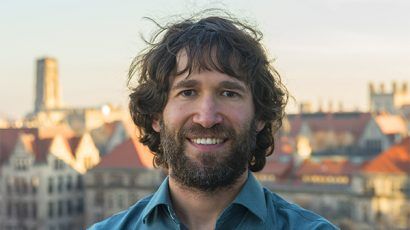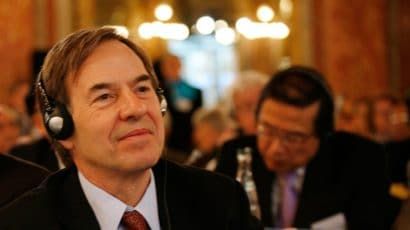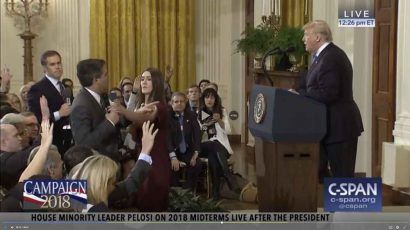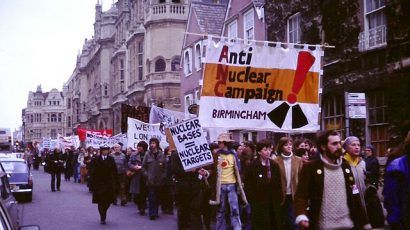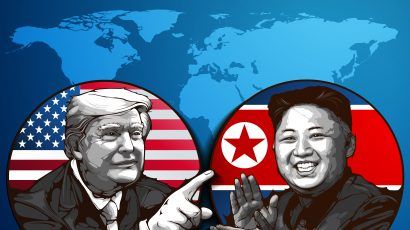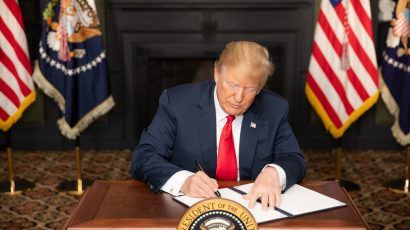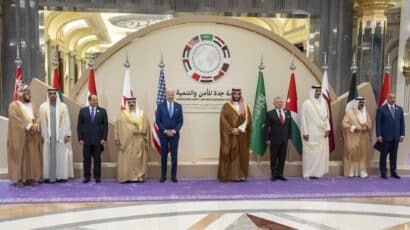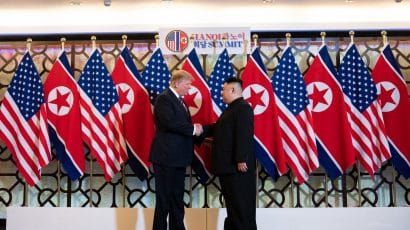Search results for trump
The slow death of nonproliferation norms
The global stigma against using chemical weapons is weakening. That’s alarming—but not as alarming as the broader breakdown of nonproliferation norms that may be in the offing.
A monumental lobbying coup
A mining company with a uranium mill bordering the Bears Ears National Monument lobbied to reduce the monument’s size. The White House listened.
Can Chinese banks identify North Korean sanctions evaders?
Anyone with an Internet connection can form a shell company. And YouTube explainers now provide guidance on concealing assets and avoiding customer due diligence.
Europe should act fast to preserve the Iran nuclear deal
Washington’s Iran policy is taking a dangerous path, but European leaders have an opportunity to shape the future of the Joint Comprehensive Plan of Action.
Turning down the heat between India and Pakistan
The United States has a new best friend, India, and that friend would like the White House to stabilize the subcontinent by putting more pressure on Pakistan to deescalate tensions.
Confronting plutonium nationalism in Northeast Asia
If President Obama is to have a lasting legacy of nuclear threat reduction, his administration needs to do far more than it has to clarify how harmful plutonium proliferation could be to keeping peace in East Asia and the world.
Mastermind or madman? Putin shows why the world needs new nuclear agreements
Regardless of Putin’s mental state, the invasion of Ukraine has made one thing clear: As soon as hostilities end, Western leaders need to engage with Putin and Chinese leader Xi Jinping to craft agreements on arms control and nuclear command and control practices that greatly reduce the possibility that any one person can take actions that put the whole of human civilization at risk.
Bruce Blair: Challenging the accidental nuclear war machine at every turn
With Blair’s death, the nuclear-disarmament movement has lost one of its most learned, creative and persistent leaders. Those of us who have had the privilege of working with him will continue to be inspired by his quiet but dogged and comprehensive commitment to the mission.
Three steps toward resolving Iran’s nuclear crisis
Three steps toward resolving Iran’s nuclear crisis The underlying assumptions on the part of Trump administration to withdraw from the Joint Comprehensive Plan of Action (JCPOA) were the following: 1) by implementing the “maximum pressure” policy, Iran’s oil exports would reach zero; its financial transactions would be fundamentally hindered and Iran’s economy would collapse; 2) … Continued
The White House shallowfake: Press secretary uses manipulated video in war against press
A video posted by the White House press secretary might not have been a deepfake, but it was at least a shallow one.
The INF Treaty and the crises of arms control
There may be more of a constituency than many imagine for the goal of a nuclear weapon free world.
How to make progress with North Korea now
The United States needs to succeed in these negotiations and verifications, and so make North Korea, like South Africa, an example of denuclearization that improves a nation’s circumstances. A patient, mutual, step-by-step path—and a willingness by the United States to consider proposals coming from North Korea that are in North Korea’s interests as well as our own—is the only route to such an outcome.
Will Iran go nuclear over reimposed sanctions?
Iran probably will withdraw from the Obama-era nuclear deal but not from the Nuclear Non-Proliferation Treaty. That leaves room for a new nuclear deal.
A presidential announcement on the Iran deal, via Twitter
Earlier today, President Donald Trump tweeted that he will be announcing his decision on whether to reimpose economic sanctions on Iran tomorrow, Tuesday, May 8, at 2 PM Eastern. Despite evidence that Tehran is complying with the terms of the Joint Comprehensive Plan of Action (JCPOA), it is widely expected that Trump will announce a … Continued
A presidential announcement on the Iran deal, via Twitter
Examine the critical elements of the Iran deal by reading through the work of our columnist, Ariane Tababai. It’s all here at the Bulletin.
China y la no proliferación: divergencia entre las políticas y las medidas adoptadas
La elección de Donald Trump como presidente de Estados Unidos ha saboteado la complicada maquinaria de la política internacional. Las opiniones de Trump sobre las relaciones internacionales y el control de armas parecen poco claras y mal desarrolladas pero tienen sin dudas una vena de sospecha hacia el multilateralismo. Trump ha comunicado su intención de … Continued
What Jeff Sessions as attorney general will mean for the Iran Deal
While the attorney general has no direct role, the actions of the Justice Department carry a ripple effect.
Why a WMD-free zone in the Middle East is more needed than ever
A growing interest in nuclear technology in the Middle East—combined with ambiguity over nuclear activities in Iran and Israel—raises concerns about potential proliferation in the region.
Interview: Siegfried Hecker on two decades of missed chances to deal with North Korea’s nuclear program
In this interview with Bulletin editor John Mecklin, former Los Alamos National Laboratory director Siegfried Hecker explains how three successive US presidential administrations failed to take advantage of an apparent willingness by North Korea to accept a fundamentally new relationship with the United States—along with significant controls on its nuclear program.
